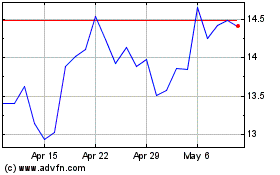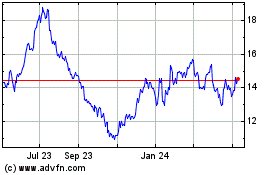By Sarah Nassauer and Emily Glazer
American businesses are poised to benefit from twin victories in
the $1.9 trillion Covid-19 relief package, which gives consumers
more money to spend but doesn't force companies to raise workers'
wages.
The legislation, expected to be signed into law by President
Biden on Friday, includes $1,400 checks to many Americans and an
extension of a $300 weekly unemployment-aid supplement. It doesn't
include a proposed increase in the minimum wage to $15 over four
years, meaning retailers, restaurants and others don't have to
worry about higher payrolls for now.
Executives and economists said that unlike the last round of
stimulus payments, which came in the midst of lockdowns and
heightened economic uncertainty, these checks are more likely to
flow into the economy as families face fewer financial constraints,
more people are vaccinated and restrictions on travel, dining and
other activity are lifted.
"All this money is coming in, and a lot of it is going to get
spent," said Jeff Aronson, co-founder and managing principal of
investment firm Centerbridge Partners. "Obviously that has huge
implications" that are good for the economy, businesses and
consumers, he said.
The bill passed the House on Wednesday, largely along party
lines with Democratic support. No Republicans voted for it, with
some saying that the economy was poised for a strong recovery
without it and that many of its measures are bloated or unnecessary
and unrelated to the crisis.
Some business leaders echoed GOP concerns even as they embraced
key elements of it.
The Business Roundtable, which counts the chief executive
officers of dozens of the biggest U.S. companies as members, said
Wednesday, "While we advocated for a more targeted approach,
enactment of this package will help deliver urgent resources to
strengthen the public health response and provide assistance for
individuals and small businesses hardest hit by the pandemic."
The U.S. Chamber of Commerce also said it would have preferred a
narrower bill. Economic data already points to building strength,
the Chamber said in a statement last week, while the current bill
"means less money for other priorities, including infrastructure
and education."
During a virtual gathering of dozens of large-company CEOs
hosted by the Yale School of Management on Wednesday morning,
nearly two-thirds, or 64%, said in a snap poll that the relief
package went too far. When asked if they support or oppose the
relief package, 34% said they strongly support it, 37% said they
somewhat support it, 14% said they somewhat oppose it and 15% said
they strongly oppose it, according to the poll.
"If you ask a bunch of CEOs, 'Could you have done it with less?'
you're always going to get into probably could've done it with
less," Doug Parker, chief executive of American Airlines Group
Inc., said during the virtual event. "But that's not the bigger
point. The bigger point is you know there's broad public support
for this bill. That's certainly true of those of us that are
running airlines."
In addition to the stimulus checks and extension of unemployment
benefits, the bill includes funds for coronavirus-related
public-health measures such as testing and vaccine distribution, a
one-year extension of the child tax credit and funds for schools,
state and local governments and small restaurants, among other
measures. (See what is in the stimulus package.)
Companies that have been hurt by the pandemic or rely directly
on robust consumer spending for sales, such as small restaurants
and retailers, cheered the bill's passage. The National Retail
Federation, Consumer Brands Association, National Restaurant
Association and Independent Restaurant Coalition supported the
bill.
"Ensuring that the American people are given the opportunity to
quickly and safely get vaccinated against Covid-19 is the most
critical component of the legislation passed," the retail
federation said last week as the bill moved through the Senate.
Danny Meyer, chief executive of Union Square Hospitality Group,
which owns several New York City restaurants, said: "This will
provide many with a fighting chance to emerge from a deep financial
hole. Positive as this news is, this should have and could have
happened last fall or winter." It "may be too late for many
independent restaurants including a couple of ours," he said.
The bill includes $28.6 billion in potential grants to small
restaurant companies that lost business because of Covid-19. Rep.
Earl Blumenauer, an Oregon Democrat who sponsored a $120 billion
restaurant stimulus bill last year that wasn't enacted, said he
believes grants will begin flowing in weeks, not months. He expects
the funding to run out given the need among restaurants and
bars.
Grants are awarded based on revenue losses from last year
compared with 2019, after deducting for past funds allocated to a
business through the federal Paycheck Protection Program. Small
restaurants will have $5 billion in dedicated funds, and those
owned by women and minorities will get to apply first.
"The PPP definitely helped us, but this will help get us to the
finish line," said Ari Weinzweig, co-founding partner of
Zingerman's Community of Businesses, an organization of food
businesses and restaurants in Ann Arbor, Mich. It lost around $15
million in sales over the course of the pandemic, despite a big
increase in mail-order sales, Mr. Weinzweig said. The organization
dropped to about 550 employees from 700, he said.
Past pandemic stimulus packages have led to higher spending,
boosting retailers and other companies.
"We have seen a lift in the past from stimulus checks--sometimes
as clear as customers receiving the money in their bank account on
a Saturday morning and then seeing a pop in our business by that
afternoon, " said Lee Bird, chief executive of home décor retailer
At Home Group Inc. "We would expect that dynamic to continue to
play out."
Visa Inc. Chief Financial Officer Vasant Prabhu said Wednesday
at an investor meeting that "when stimulus checks hit, you
immediately get the impact." In January, the checks led to a big
surge "in our debit business in the first couple of weeks," he
said.
Heather Haddon contributed to this article.
Write to Sarah Nassauer at sarah.nassauer@wsj.com and Emily
Glazer at emily.glazer@wsj.com
(END) Dow Jones Newswires
March 11, 2021 07:14 ET (12:14 GMT)
Copyright (c) 2021 Dow Jones & Company, Inc.
American Airlines (NASDAQ:AAL)
Historical Stock Chart
From Mar 2024 to Apr 2024

American Airlines (NASDAQ:AAL)
Historical Stock Chart
From Apr 2023 to Apr 2024
